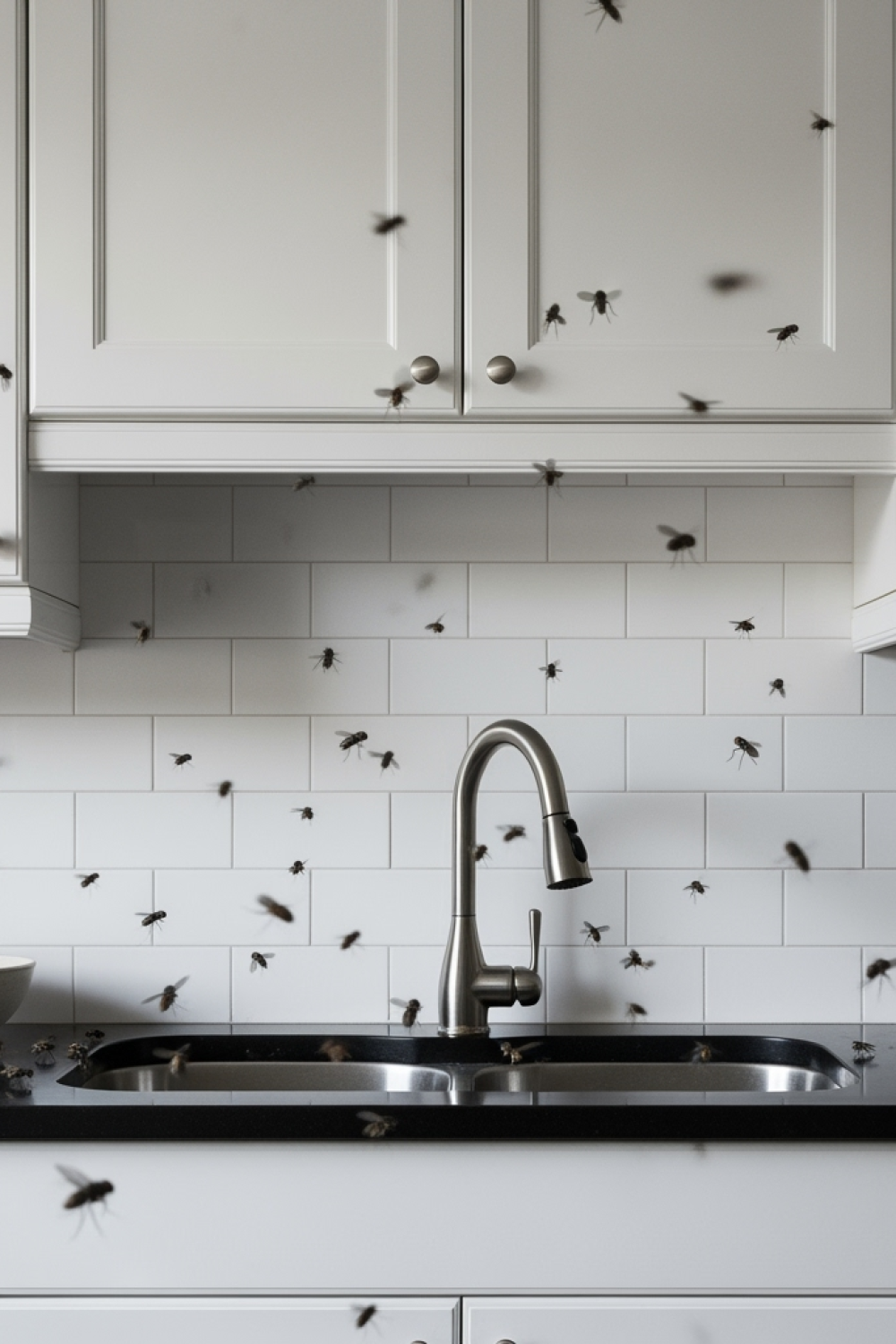Want to save this recipe?
Enter your email below and we’ll send the recipe straight to your inbox!
Flies invading your home aren’t just unwelcome visitors. Their annoying presence can actually carry important messages about your environment and daily life. These small flying insects, which seem to appear as if by magic, actually follow specific patterns guided by specific environmental factors.
If you regularly face these buzzing intruders, it’s time to understand what their presence really means and how to effectively address it with simple, natural solutions.
Why Flies Invade Your Home: What This Reveals
Flies don’t choose your home randomly. Their presence is generally linked to specific conditions that attract them. First and foremost, food residue is their main motivation: crumbs left on the counter, an overflowing trash can, or overripe fruit forgotten in a basket. Summer heat accelerates the decomposition of these organic materials, creating a veritable paradise for these opportunistic insects.
A fly infestation can also be a warning sign of more subtle problems: poor ventilation, untreated damp corners, or even a hidden issue in your plumbing. A discrete water leak or drainage problem can create the ideal environment for these insects. If flies persist despite all your efforts, it would be wise to examine your plumbing.
It’s important to note that not all flies look alike. Classic house flies are generally quite large and noisy, while fruit flies are smaller and appear as soon as fruit begins to over-ripen. In some rarer cases, the persistent presence of flies may signal a small deceased animal in an air duct or attic – an unpleasant situation but one that requires prompt intervention.
Effective Preventive Measures Against Fly Invasions
The first weapon against flies remains daily hygiene. Simple but essential actions can make all the difference:
Strategic Cleaning of Critical Points
Empty your trash cans regularly before they overflow and occasionally clean them with diluted white vinegar. Systematically wipe kitchen surfaces after meal preparation, especially if sweet foods have been handled. Crumbs and residues invisible to the naked eye remain perfectly detectable to flies.
Protecting Fruits and Food
Store ripe fruits in the refrigerator or under a food cover. A simple but effective trick is to place a cork cut in half in your fruit basket – the natural smell of cork tends to repel flies without being harmful to you or your food.
Controlled Ventilation and Humidity
Regularly air out your home, particularly the kitchen and bathroom. Excess moisture attracts flies, so make sure damp areas dry properly. Regularly check under the sink and around pipes to detect potential leaks.
Truly Effective Natural Solutions
For those who prefer to avoid chemical insecticides, there are several natural alternatives that prove effective:
The Apple Cider Vinegar Trap
A glass containing apple cider vinegar with a few drops of dish soap makes a formidable trap. The smell attracts fruit flies, but the liquid traps them. Discreetly place this trap in a corner of your kitchen for guaranteed results.
Repellent Essential Oils
Certain essential oils like citronella, lavender, or eucalyptus are known for their insect-repelling properties. A few diluted drops in a diffuser or on a cloth placed near windows can create an effective olfactory barrier.
Anti-Insect Plants
Grow repellent plants near your windows or on your balcony. Basil, mint, and lavender are not only decorative but also very effective against flying insects. As a bonus, these plants can be used in cooking or to prepare infusions!
Common Mistakes to Avoid When Dealing with Flies
Many people make mistakes that can worsen a fly infestation:
- Leaving stagnant water (in plant saucers, for example)
- Forgetting to regularly clean recycling bins
- Neglecting to clean water drains (siphons)
- Using scented sweet products that can attract rather than repel
- Leaving windows open without screens during summer
Benefits of a Fly-Free Environment
Beyond simple comfort, maintaining a space without flies has several substantial advantages:
Health Benefits
Flies are known to carry bacteria and potentially spread diseases. They often land on waste before coming to our food or kitchen surfaces. Reducing their presence directly contributes to a healthier environment.
Benefits for Daily Comfort
A space without the constant buzzing and impromptu landings of flies is simply more pleasant to live in. It also helps avoid unsightly spots on surfaces, particularly on windows and light fixtures.
Positive Ecological Impact
Using natural methods to control flies reduces your dependence on chemical insecticides, which is beneficial both for the environment and for the indoor air quality of your home.
In Summary: Regain Your Indoor Tranquility
The flies entering your home aren’t simply random visitors – they’re telling you something about your domestic environment. By adopting a preventive approach based on daily hygiene and complementing it with natural solutions, you can easily reduce their presence.
The essential thing is to remain vigilant about the conditions that attract them: food residues, excessive moisture, and potential plumbing problems. By taking care of these aspects, you’ll transform your house into a fly-proof place that’s healthier and more pleasant to live in.
Frequently Asked Questions
Can flies truly be dangerous to health?
Yes, flies can carry various bacteria on their legs and body. They often land on decomposing matter before landing on our food or kitchen surfaces, potentially transferring pathogens.
What is the average lifespan of a house fly?
The house fly typically lives between 15 and 30 days, but can lay up to 500 eggs during this short period, hence the importance of acting quickly when facing an infestation.
Are flies attracted to certain colors?
Flies are particularly attracted to light colors, notably white and yellow. This is why some commercial traps use these colors to attract these insects.
Are electronic ultrasonic repellents effective against flies?
Scientific studies show mixed results regarding the effectiveness of ultrasonic repellents. Mechanical methods (like traps) and solutions based on natural repellent odors generally seem more reliable for controlling fly populations.

